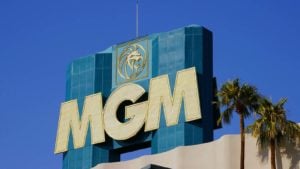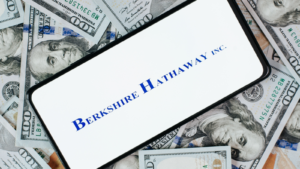Why not spin off Oscar Mayer into its own publicly traded company? Estimates put the brand’s value between $3 billion and $5 billion. While its market capitalization puts it outside S&P 500 eligibility, the unspoken truth is that consumers would love to own a piece of the Oscar Mayer Wienermobile.
So, Kraft Heinz, think about spinning off Oscar Mayer rather than selling it outright to a private equity or strategic buyer.
Of the S&P 500 constituents, there has got to be at least three spinoff possibilities from the 503 names currently in the index.
To diversify my selections, I’ll pick stocks from three different sectors that also make money now and should continue to do so in the future.
J.M. Smucker (SJM)

J.M. Smucker (NYSE:SJM) is best known for its jellies and jams. However, in the past decade, it’s grown its pet food business significantly, making several large acquisitions. As a result, its pet food and treats business accounts for 21% of its revenue.
The problem is that it is not really committed to the pet food business, as exhibited by the sale in April 2023 of several of its pet food brands, including Rachel Ray Nutrish, 9Lives, Kibbles €˜n Bits, Nature’s Recipe, and Gravy Train, as well as its private label pet food business, to Post Holdings (NYSE:POST) for $684 million in cash and $492 million of its stock.
That’s less than 1x sales with a pre-tax loss of $1.0 billion. The brands represented sales of $1.5 billion in fiscal 2023 or approximately 50% of the U.S. Retail Pet Foods segment. Last year, the segment accounted for nearly 36% of its $8.53 billion overall revenue.
Except for Freshpet (NASDAQ:FRPT), there aren’t any sizeable pure-play pet food companies.
Freshpet trades at 7.4x sales. Smucker’s pet food business is expected to generate about $1.8 billion in revenue in fiscal 2024 and far more profitable, generating a 21% margin through the nine months ended Jan. 31. While Freshpet hasn’t made an operating profit in the past three years, I could easily see Smucker’s pet food business going public at a market capitalization of $13-$14 billion based on a similar P/S multiple as Freshpet.
Considering SJM stock is down 11% over the past five years, a spinoff would be an excellent way to keep shareholders happy with the underperformance.
MGM Resorts International (MGM)

MGM Resorts International (NYSE:MGM) spun off much of its real estate in 2016 under the MGM Growth Properties name, operating as a REIT (real estate investment trust). In April 2022, MGM Growth Properties was acquired by VICI Properties (NYSE:VICI), a REIT, for $17.2 billion.
Today, MGM Resorts International has an asset-light business model, which operates 31 hotel and gaming destinations worldwide. It also has a 50/50 venture with Entain plc (OTCMKTS:GMVHY), a UK-based international sports betting and gaming company, in BetMGM.
In fiscal 2023 (December year-end), BetMGM had $1.96 billion in annual net revenue, 36% higher than a year earlier. In the second half of last year, it generated an EBITDA (earnings before interest, taxes, depreciation, and amortization) profit. By 2026, it expects EBITDA to hit $500 million.
DraftKings (NASDAQ:DKNG) is one of the largest online sports betting businesses in the U.S. It’s valued at 5.1x sales. If BetMGM were valued at that multiple, it would have a market cap of $10.0 billion. Its 50% stake would be worth nearly 40% of its current market cap of $12.9 billion.
It could go public, wait 2-3 years, and merge with DraftKings to become a massive global sports betting conglomerate.
Funnier things have happened.
Berkshire Hathaway (BRK.B)

If you follow my writing, you might be aware that I’ve suggested several times in the past how Berkshire Hathaway (NYSE:BRK.B) can add value for its shareholders.
Don’t get me wrong, I’m a fan of Warren Buffett’s like everybody else. It’s just that things about the business make you scratch your head.
McLane Company stands out as one of the company’s mystery holdings.
Acquired from Walmart (NYSE:WMT) in 2003 for $1.5 billion, the company was and remains one of the country’s largest wholesale distributors of groceries and nonfood items to convenience stores, wholesale clubs, and other food and beverage-related businesses. It is also a wholesale distributor of distilled spirits, wine, and beer.
At the time, it had annual revenue of $23 billion and a 1% pre-tax profit margin. In 2023, it had $52.6 billion in revenue and a 1% pre-tax margin.
While it has some great customers €”Walmart, 7-Eleven, and Yum! Brands (NYSE:YUM) account for 43.3% of revenue €”obscuring Berkshire’s revenue and earnings growth potential.
If you exclude McLane from 2023’s results, its revenues would have been $311.9 billion, with a pre-tax profit of $119.7 billion, a 38.4% pre-tax margin, 540 basis points higher than with McLane included.
Berkshire makes more in dividends from some of its equity holdings than McLane.
It should spin McLane off and keep a small piece of its massive equity portfolio.
On the date of publication, Will Ashworth did not have (either directly or indirectly) any positions in the securities mentioned in this article. The opinions expressed in this article are those of the writer, subject to the InvestorPlace.com Publishing Guidelines.
Will Ashworth has written about investments full-time since 2008. Publications where he’s appeared include InvestorPlace, The Motley Fool Canada, Investopedia, Kiplinger, and several others in both the U.S. and Canada. He particularly enjoys creating model portfolios that stand the test of time. He lives in Halifax, Nova Scotia.
